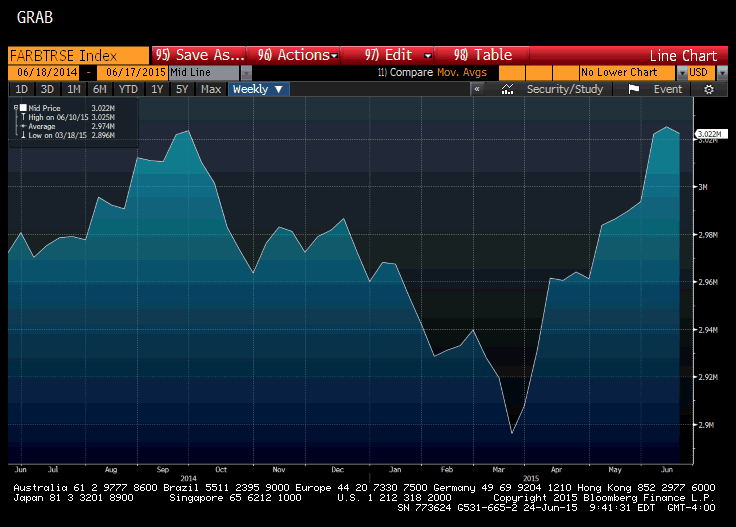The Federal Reserve offers custodial services for foreign central banks. Precisely which countries use these services is confidential as is who patronizes a commercial bank's services.
There was a large draw down in the Treasuries the Fed holds for foreign officials beginning last September and running through mid-March. During this period the Fed's custody holdings of Treasuries fell from $3.024 trillion to $2.974 trillion (see the Great Graphic from Bloomberg below).
Understanding why they fell will help us appreciate why since the mid-March, custody holdings jumped to set a new record higher of $3.025 trillion in the week ending June 10. They slipped marginally in the week through June 17. New data will be released tomorrow. 
As the US dollar appreciated in Q3 and Q4 2014, foreign central banks intervened to smooth out the decline in their currency in order to minimize disruptions for economic agents and domestic markets. The "currency war" meme does not make sense of this: central banks spent about $50 bln defending their currencies from falling to far too fast.
What happened in the middle of March? The dollar stopped falling. As it rose, some central banks rebuilt the reserves that they had drawn down. It took the central banks half the time to rebuild the reserves as to draw them down.
There are several emerging market countries that are likely candidates. South Korea, Taiwan, India and Russia are reasonable suspects. However, given the tension between the US and Russia, it would seem unreasonable that Russia would be using the Fed's custody services.
China's reserve accumulation has slowed. The drop in oil prices reduces OPEC's surplus by as much as $1 trillion and this will slow its reserve accumulation. Indeed there is potential that if oil prices do not recover much more in the coming months, some countries producers may have to tap their reserves to close a fiscal gap. The prospects are for reserve growth to slow going forward.
Next week the IMF will publish its COFER (reserve) data for Q1 15. The dollar share of global reserves likely jumped, but caution is in order. Whatever quantity of reserves that were adjusted, valuation swings likely overwhelmed it. Specifically in Q1, the euro fell 11.3%, the pound lost 4.9%, the Australian dollar fell nearly 7% and the Canadian dollar lost 8.4%. The dollar was stuck in a clear range against the yen. The yen fell about 0.3% in Q1.
Milton Friedman once suggested that central bank intervention was long-term counter-trend speculation. When the dollar is strong, central banks are more likely to be sellers of dollars (and Treasuries). When the dollar is weak, central banks are more likely to be buyers of dollars (and Treasuries). This pattern is unlikely to change. The holdings of reserves (stock) is much larger than any quarterly change (flow) making valuation a key component in understanding the value of reserves.
